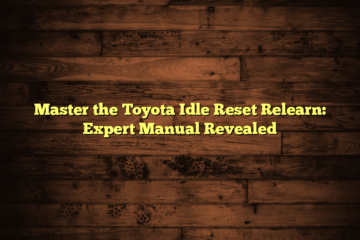Mastering Torque Converter Bolts Torque Specs: Unleash the Power
The torque specification for torque converter bolts is typically between 20-25 foot-pounds. It is crucial to consult the vehicle’s specific manual for the precise torque specs.
Torque converter bolts are an essential component in the transmission system of a vehicle. Proper tightening of these bolts is crucial to ensure the smooth and efficient operation of the transmission. To avoid any potential issues and ensure the longevity of the transmission system, it is important to adhere to the manufacturer’s recommended torque specifications for these bolts.
Failure to tighten the bolts to the correct specifications can lead to slippage, improper operation, and potential damage to the transmission. Inadequate torque can also result in leaks and other issues, leading to costly repairs. Therefore, it is imperative to always use a torque wrench and follow the specific torque specifications provided in the vehicle’s manual.
Importance Of Torque Converter Bolts
Torque Converter Bolts play a crucial role in power transmission. Correct torque specs are essential for optimal engine output. Tightening these bolts ensures efficient torque transfer. Inadequate torque settings may lead to slippage and damage. Insufficient tightening can cause performance issues. Proper torque values are vital for preventive maintenance. Check manufacturer specifications for the accurate torque requirements.
Understanding Torque Specs
Understanding Torque Specs Torque specs refer to the specific amount of force required to tighten the bolts on a torque converter. It is crucial to adhere to the specified torque values for ensuring the stability and proper functioning of the torque converter, which is vital for the overall performance of the vehicle. Correct torque values help in preventing over-tightening or under-tightening of the bolts, which can lead to damaged components and affect the functionality of the torque converter. When the torque specs are correctly followed, it enhances the safety and reliability of the vehicle, reducing the risk of mechanical issues and maintaining optimal performance.
Tools Required For Torquing
Using the right tools is essential for accurate torqueing of torque converter bolts. Here are the essential tools you’ll need for the job:
- Torque Wrench: A torque wrench is a must-have tool for applying the correct amount of torque to the bolts. It ensures that the bolts are tightened to the specified torque specs without over or under-tightening.
- Sockets: You’ll need appropriate-sized sockets for the torque wrench to fit onto the torque converter bolts.
- Extension Bar: An extension bar allows you to reach bolts that are in tight or hard-to-reach spaces within the vehicle.
- Breaker Bar: In case the torque converter bolts are tightened excessively, a breaker bar can help you loosen them without exerting excessive force.
- Lubricant: Applying a suitable lubricant to the bolts helps reduce friction and ensures smooth and accurate torque application.
Using these tools correctly will help you achieve the proper torque specs and ensure a secure and reliable connection between the torque converter and the engine.
Step-by-step Guide To Torque Converter Bolts
|
Make sure to prepare all necessary tools and equipment before beginning the torque converter bolts tightening process. Double-check the torque specs provided by the manufacturer to ensure accurate torque application. |
Common Mistakes To Avoid
Over-torquing concerns: Over-tightening the torque converter bolts can lead to damaged threads or even breakage, causing potential transmission issues.
Under-torquing risks: Failing to properly torque the converter bolts can result in loose bolts, leading to inefficient power transfer and potential damage to the transmission.
Benefits Of Proper Torqueing
Proper torqueing ensures enhanced engine efficiency. It helps in preventing damages to critical components. Using correct torque specs for torque converter bolts is crucial for optimal performance. It also extends the lifespan of the converter and reduces the risk of failures. By following recommended torque settings, you can avoid issues such as bolts loosening or over-tightening. This simple practice can make a significant impact on the overall reliability and longevity of the torque converter assembly.
Frequently Asked Questions
What Is The Torque For The Torque Converter Bolts?
The torque for torque converter bolts varies based on the specific engine and model. Refer to the manufacturer’s specifications for the accurate torque rating.
What Should Flexplate Bolts Be Torqued To?
Flexplate bolts should be torqued to the manufacturer’s specifications. It is important to follow these specifications to ensure proper installation and prevent any issues with the flexplate. Consult the vehicle’s manual or contact the manufacturer for the specific torque value.
Can You Tighten Torque Converter Bolts?
Yes, you can tighten torque converter bolts to ensure proper alignment and secure connection. It’s vital for smooth transmission operation and preventing potential damages. Always refer to the manufacturer’s guidelines for the correct torque specifications.
What Torque Should A Transmission Bolt Be?
Transmission bolts should be torqued to the specific manufacturer’s recommendation for each individual vehicle model. Be sure to consult the service manual for accurate torque specifications.
What Is The Torque Specification For Torque Converter Bolts?
The torque specification for torque converter bolts varies depending on the specific vehicle and engine model. It is important to consult the vehicle’s service manual or reach out to a mechanic for the accurate torque specification.
Conclusion
It’s crucial to torque torque converter bolts to the manufacturer’s specifications. This ensures proper functionality and prevents potential issues. Following the recommended torque specs is essential for the longevity and performance of the torque converter. Stay diligent and refer to your vehicle’s specific guidelines for safe and effective installation.



